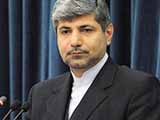Today.Az » World news » Iran ready to do uranium exchange with new countries, says ministry
07 March 2010 [17:12] - Today.Az
 Iran is ready to conduct its uranium exchange plan also with fresh countries, Foreign Ministry spokesman Ramin Mehmanparast said Sunday.
Iran is ready to conduct its uranium exchange plan also with fresh countries, Foreign Ministry spokesman Ramin Mehmanparast said Sunday.
"As we have reached no results yet with France, Russia and the United States over the uranium exchange plan, the International Atomic Energy Agency (IAEA) head has asked other countries to get involved," Mehmanparast said.
"We will wait and see whether other countries would be capable to provide us with the required fuel," the spokesman added in a meeting with students at the Shahid Beheshti university in Tehran.
Japan is reportedly one of the countries interested to get engaged in the deal.
Last October, the IAEA brokered a deal under which Iran would exchange low-enriched uranium for foreign-made nuclear fuel that would power a medical-purpose reactor in Tehran.
Iran voiced readiness to either buy the fuel for the Tehran reactor or make it itself or export its low-enriched uranium (LEU) in return for processed fuel in line with the initial IAEA plan, as long as certain guarantees were put in place.
Iran however insists that the swap should be made on Iranian soil, and rejected any third country as a venue for the exchange which both the world powers and the IAEA have so far rejected.
Iran last month started the process of boosting its 3.5 per cent LEU to 20 per cent - although experts say that the country did not yet have the capability to make actual fuel elements for the Tehran reactor.
"If the agreement is further delayed, then we will cover our needs by our own 20 per cent enrichment process and the (IAEA brokered) exchange plan would have no meaning anymore," Mehmanparst said.
The spokesman once again reiterated that Iran's nuclear projects were solely for peaceful purposes and rejected Western charges of a secret military program.
He said that the Iranian progress in missiles' technology in the recent years should not be regarded by the world powers as a provocation as the Iranian defense potentials just deterrent aims.
The main Western - and especially Israeli - concern are the Iranian medium-range missiles Shahab and Sejil, as they would be able to hit any part of the Jewish state.
"If a country wants growth and development, then it should insist on its rights and not wait others to grant us these rights," the spokesman said while reiterating Iran's internationally acknowledged right to pursue a civil nuclear program.
Iran is ready to negotiate with the world powers over its nuclear programs and remove ambiguities but not, as demanded by the West and the United Nations Security Council, to suspend the uranium enrichment process.
Iran's atomic chief Ali-Akbar Salehi even proclaimed last month that in the new Persian year, which begins March 21, the country planned to build 10 new enrichment sites, followed by 10 more in the future.
/Trend News/
|
|